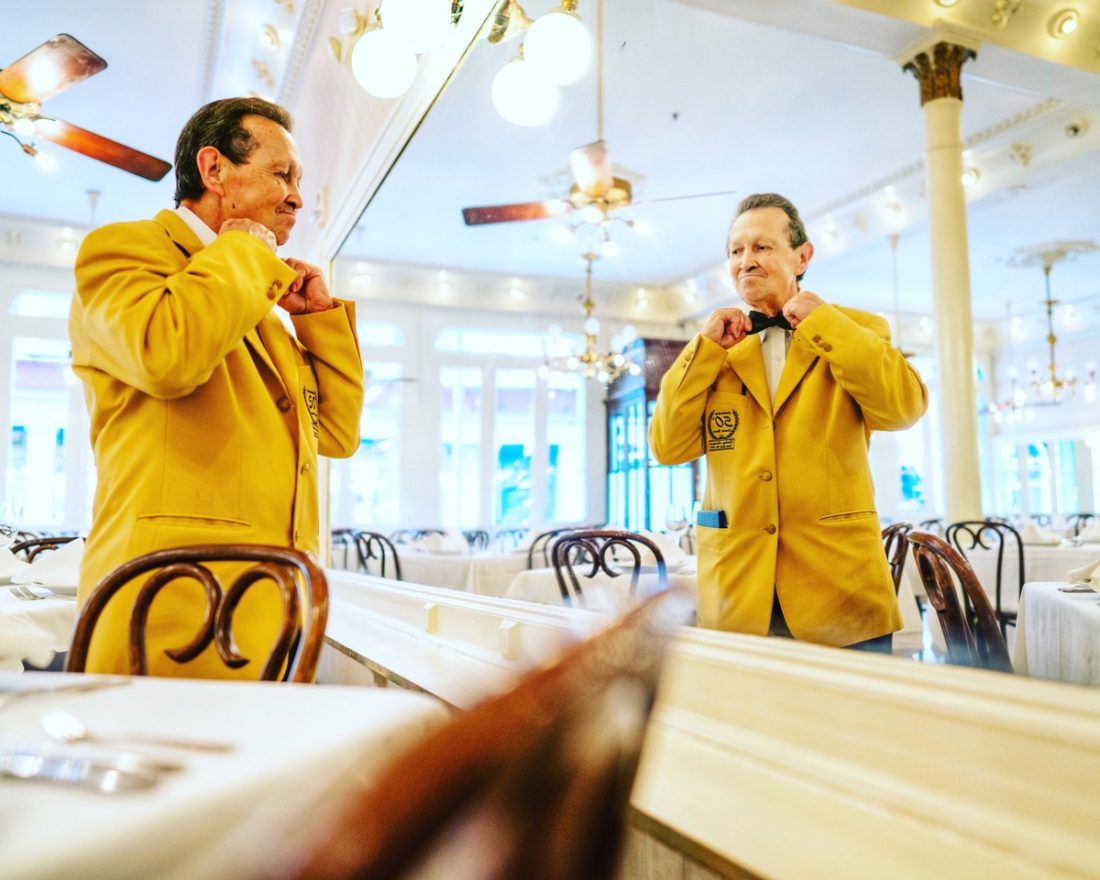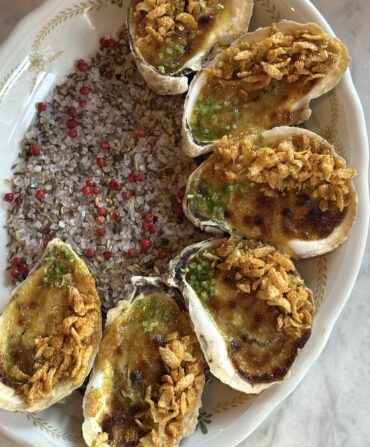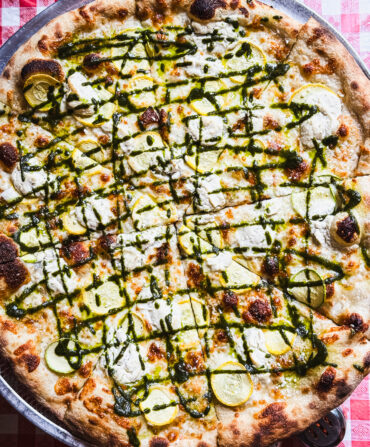Written by John T. Edge in collaboration with the Southern Foodways Alliance
Raunchy and sweet and, at times, psychedelic, The Last Taxi Driver by Lee Durkee moves fast, as our hero Lou shuttles fares across a small college town that looks very familiar. Lee, who lives here in Oxford, shows us how drivers like Lou serve humanity, how they take on whatever crisis a fare brings to their cab, cope as best they can, and pivot to the next. Like a waiter working a dining room last month, like a nurse walking the floor of an emergency room right now, Lou is a pragmatist, focused on the task at hand, buoyed by empathy for the people he serves.
Reading Lee’s book, the first of many since this contagion began to creep our way, I thought of a favorite waiter at City Grocery here in Oxford. Eyeglasses sliding down his nose, skinny tie cinched loose around his neck, Terry Moon smiles at you in a way that says, Never mind the bollocks. He began his career more than thirty years ago at a TGI Fridays near Cleveland, Ohio. Since 2000, he’s worked on and off at City Grocery, serving Oxford.
During our last conversation a couple months back, my wife Blair asked him to retell a story from years ago, in which, serving a table with the swagger and flourish for which he is beloved, Terry accidentally whacked a small child in the head with an oversized wooden pepper mill.
I can’t recall many of the details from his story, other than the child he accidentally hit was okay. And that, as Terry told the story, we laughed hard, tears streaming down our cheeks, gasping for breath, joyous in the release of the moment. Terry was not embarrassed. Instead, when we calmed, he leaned back in to add new details, arching his eyebrows, saying to us and to himself, I am not perfect. I never will be. But here I stand. And here I will stand tomorrow.
On March 18, City Grocery furloughed many of its hourly employees, so that they could file for unemployment insurance. Terry stayed on but without the bonus that tips once brought. On March 23, as I made a small Venmo contribution to another local restaurant’s employee relief fund, I saw a transaction from a friend scroll by. Terry’s name was attached. It read “Advance on future tips.” I closed my eyes and pictured Terry, leaning over our table, smiling a cockeyed smile. I conjured a future when he will return to City Grocery and we will again be in his thrall. I said thanks for friends and neighbors who, in this fragile moment, value those who serve. And I advanced him a tip, too.

For the last nine months, my Southern Foodways Alliance colleague Annemarie Anderson has been collecting and processing oral histories of career servers who work restaurants in Atlanta, New Orleans, and Charleston. Now that the great majority of the women and men who wait tables in America have been furloughed, their transcripts play across pages like elegies. Read another way, their stories inspire new dreams of life and work on the other side of this pandemic.
Some of the most compelling stories come from Bones in Atlanta, a steakhouse founded in 1979, where the coins of the realm are dry-aged porterhouses, onion ring stacks, stiff cocktails, and sure service. When I lived in Atlanta in the late 1980s and early 1990s, Bones was the seat of power, the sort of place where the real estate men in the Tom Wolfe novel A Man in Full gathered to drink old fashioneds and plot financing for skyscrapers and atrium hotels.
Bones endures. And so do the men who walked the floors here nightly until March 20, when Bones temporarily closed to protect the safety of its employees and guests. Read the transcripts of Annemarie’s oral histories and you get to know Ali Zarbashi, who grew up in Tehran, immigrated to Atlanta in 1978, and won his first restaurant job at Pizza Hut. On March 3 of this year, he marked his 40th year walking the floors at Bones.
David Evans, a native of Atlanta, began his restaurant career as a busser at IHOP. When he won a job at Bones in 1983, he found his people. Evans talked to Annemarie about the sort of hospitality that Bones has systematized, and the waiters here have adapted to suit their personalities and their guests. “It’s not just food we’re serving here,” he said. “It’s dignity. It’s making people feel good and making people look good.”
“Everybody can be great,” Martin Luther King Jr declared from an Atlanta pulpit in February of 1968, “because everybody can serve.” In the wake of this crisis, Americans will ask hard questions about how we regard and treat those of us who serve. Hospitals and restaurants will be ideal places to ground those questions. We will ask about doctors and nurses, forced to work in this moment without adequate protective equipment. And we will ask about waiters and cooks, who live to serve and who, too often, live without adequate social safety nets.

Since March 15 when our little family bunkered in here in Oxford, I’ve been saving pictures from the current health crisis in my phone. Later, when I try to make sense of what happened, I trust these snapshots to serve as a timeline of what I saw and heard, of who served my family and how I tried to serve others.
I scroll these photos to revisit our son’s 19th birthday party, and the mobile that Blair made from junk food and hung above our dining room table. I scroll to remember the batch of egg foo young I wok-fried for an early dinner. And the portrait of Goren “Red Dog” Avery that my friend Pardis Stitt of Highlands Bar and Grill in Birmingham sent on the last night of service before they temporarily closed. No matter how much I scroll, I keep coming back to one image.
On the Tuesday night before Governor John Bel Edwards shut restaurant dining rooms in Louisiana, Chris Granger captured a portrait of Sterling Constant, a waiter for 53 years at Antoine’s Restaurant in New Orleans. Outside the frame, day drunks pushed through the streets of the French Quarter. And the virus leapfrogged from victim to victim.
Inside the frame, resplendent in a mustard-colored waiter’s jacket, Constant stood amid a sea of linen-draped tables. A night of service lay ahead. A check pad poked from his right blouse pocket. Hair raked back, a look of pride and determination on his face, Constant straightened his black bow tie as Granger turned the camera his way.
When I think back on scenes from The Last Taxi Driver, I see Constant’s face. When I revisit dinners at City Grocery, I see that same pride in Terry’s stance. And I hear that same determination in Annemarie’s oral history interviews. Today, we see clearly the grace and sacrifice of those who serve. Can we carry that clarity forward? I pray that we ask each other that question as the curve flattens and the veil lifts and we step together toward a new and fragile future.








